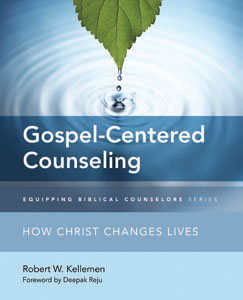Does gospel-centered counseling really work? Isn’t this a crucial question for biblical counselors and counselees? Listen to this story.
Meet Ashley and Nate
Ashley and her husband, Nate, met with Pastor Bob Kellemen at church the day after their twin sons’ eleventh birthday. With tears streaming down her face, Ashley shared that twenty-five years earlier, not long after her eleventh birthday, a relative had begun sexually abusing her.
Those who knew Ashley would have been shocked. She grew up in a Christian home, was active at church as an adult, served as a leader in the women’s ministry, and was always “pleasant.”
As Ashley described herself, “I’m the good girl from the good home.
“The good mom; the good wife. But nobody knows the ugliness I feel inside. Nobody knows how I’ve pretended and denied all these years. I just can’t keep faking it any longer. Depressed to the point that at times I’ve thought about suicide. Fearful and anxious—terrified I’ll displease someone. Terrified someone will find out what an empty but evil thing I am…”
As Ashley’s voice trailed off, Nate asked, “Pastor Bob, can you help?
Does the Bible offer any hope for my wife?”
How we respond to Ashley’s soul struggles and to Nate’s life questions depends on how we answer a foundational question: “What would a model of counseling look like that was built solely upon Christ’s gospel of grace?”
Bob Kellemen has written numerous books to help the local church, biblical counselors, and the hurting find hope, including Gospel-Centered Counseling, How Christ Changes Lives.
An Interview with the Author
Q: Bob, what was was on your heart as you wrote Gospel-Centered Counseling?
BK: As I wrote Gospel Centered Counseling, I kept seeing lay people with hurting friends in a Starbucks and wondering how the gospel helps. I kept envisioning a lay biblical counselor seeking wisdom to help someone caught in a besetting sin. And I kept thinking about the pastor in his office needing biblical guidance to relate God’s truth to people’s lives. So, I wrote Gospel-Centered Counseling for every person who longs to see lives changed with Christ’s changeless truth, for everyone who wants to speak the truth in love.
 Q: Bob, what is the book’s main purpose?
Q: Bob, what is the book’s main purpose?
BK: For the past three decades, I’ve pursued one foundational question that I believe every biblical counselor must answer. “What would a model of biblical counseling look like that was built solely upon Christ’s gospel of grace?” To answer this foundational question, I address eight ultimate life questions in Gospel-Centered Counseling.”
Q: Sounds fascinating. What are these eight ultimate life questions?
BK: The questions follow the traditional Creation/Fall/Redemption model, but they expand that concept to address a comprehensive biblical theology of biblical counseling. Here’s how I organize life’s eight ultimate questions in Gospel-Centered Counseling.
1. The Word: Where do we find wisdom for life in a broken world?
2. The Trinity/Community: What comes into our mind when we think about God? Whose view of God will we believe—Christ’s or Satan’s?
3. Creation: Whose are we? In what story do we find ourselves?
4. Fall: What’s the root source of our problem? What went wrong?
5. Redemption: How does Christ bring us peace with God? How does Christ change people?
6. Church: Where can we find a place to belong and become?
7. Consummation: How does our future destiny with Christ make a difference in our lives today as saints who struggle against suffering and sin?
8. Sanctification: Why are we here? How do we become like Jesus? How can our inner life increasingly reflect the inner life of Christ?
Q: So it sounds like Gospel-Centered Counseling provides a theological foundation for counseling. Is that right?
BK: Yes—especially when we understand that theology matters. Theology is for life. Everyone wants to know what makes biblical counseling truly biblical. I believe that counsel is biblical when we build our understanding of God, life, people, problems, and solutions on Christ’s gospel of grace. Gospel-Centered Counseling shows how robust, relevant, and relational God’s Word is for our daily lives. It is a theological primer, a gospel primer, that shows us how Christ changes lives.”
Q: That last phrase reminds us of your subtitle–How Christ Changes Lives. Tell us more about the importance of the subtitle.
BK: In our biblical counseling world we often talk about how people change. The subtitle tweaks that in a significant way—it is Christ’s gospel of grace that changes us. We are forgiven by grace and we are changed by grace—made new creations in Christ. And we keep growing in grace—sanctification grace.
Go Deeper
To learn more about Gospel-Centered Counseling, head over to this page where you’ll find a complimentary copy of the Foreword and Introduction, a free discussion guide, along with tweet-size summaries of every chapter.
COUNSELING: Have you experienced sexual abuse like Ashley? Do you struggle with another life struggle? Then contact us for counseling in person or by Skype. Our trained, experienced biblical counselors are ready to help you.
TRAINING: Biblical Counseling Center offers online, self-paced training at our online school. 2 Certificate levels. Affordable, self-paced. May be taken for college credit. Contact us to get your link to the courses.









2 Comments on “Does Gospel-Centered Counseling Really Work?”
Pingback: Biblical Counseling Center | When to Listen, When to Talk - Biblical Counseling Center
Pingback: Biblical Counseling Center | How the 'Other Gospel' Hurts You! - Biblical Counseling Center